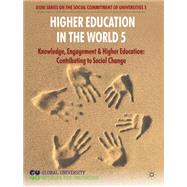GUNi Series on the Social Commitment of Universities
Higher Education in the World 5
Knowledge, Engagement and Higher Education: Contributing to Social Change
We are living through a crisis of scale that affects all systems and that requires a new understanding of human progress and a new conscience that supports a new way of being in the world. The fifth edition of the GUNi Report, entitled: Knowledge, Engagement and Higher Education: Contributing to Social Change, explores the critical dimensions in our understanding of the roles and potential roles of knowledge, civil society and higher education institutions (HEIs) as active players in contributing to the creation of more just and sustainable world.
The creation and dissemination of relevant knowledge could contribute to transforming the paradigms and beliefs established in social, economic and political systems and to moving to creative and innovative way of thinking and imagining new realities. Knowledge could help in raising ethical awareness and facilitating the civic commitment of people and professionals. In this sense, this Report will call upon policy-makers, scholars and leaders of HEIs around the world to rethink the social responsibility of HE.
The Report provides visibility and critically examines the theory and practice of engagement. It approaches the challenge of Community-University Engagement (CUE) in an integrated manner. It explores ways in which engagement enhances teaching and learning, research, knowledge mobilization and dissemination. It approaches engagement in ways that accept the multiple sites and epistemologies of knowledge, as well as the reciprocity and mutuality in learning and education through engagement.
The Report offers elements of a vision for a renewed and socially responsible relationship between higher education, knowledge and society. It is a product of three years research, in which 73 authors from all the world regions have contributed.
GUNi has previously published four issues of the Higher Education in the World report (2006, 2007, 2008, 2011), plus a synthesis (2009) committed by UNESCO for the II World Conference on Higher Education held in Paris in 2009.
www.guninetwork.org
Higher Education in the World 5
Knowledge, Engagement and Higher Education: Contributing to Social Change
We are living through a crisis of scale that affects all systems and that requires a new understanding of human progress and a new conscience that supports a new way of being in the world. The fifth edition of the GUNi Report, entitled: Knowledge, Engagement and Higher Education: Contributing to Social Change, explores the critical dimensions in our understanding of the roles and potential roles of knowledge, civil society and higher education institutions (HEIs) as active players in contributing to the creation of more just and sustainable world.
The creation and dissemination of relevant knowledge could contribute to transforming the paradigms and beliefs established in social, economic and political systems and to moving to creative and innovative way of thinking and imagining new realities. Knowledge could help in raising ethical awareness and facilitating the civic commitment of people and professionals. In this sense, this Report will call upon policy-makers, scholars and leaders of HEIs around the world to rethink the social responsibility of HE.
The Report provides visibility and critically examines the theory and practice of engagement. It approaches the challenge of Community-University Engagement (CUE) in an integrated manner. It explores ways in which engagement enhances teaching and learning, research, knowledge mobilization and dissemination. It approaches engagement in ways that accept the multiple sites and epistemologies of knowledge, as well as the reciprocity and mutuality in learning and education through engagement.
The Report offers elements of a vision for a renewed and socially responsible relationship between higher education, knowledge and society. It is a product of three years research, in which 73 authors from all the world regions have contributed.
GUNi has previously published four issues of the Higher Education in the World report (2006, 2007, 2008, 2011), plus a synthesis (2009) committed by UNESCO for the II World Conference on Higher Education held in Paris in 2009.
www.guninetwork.org








